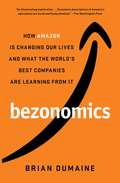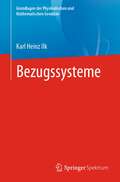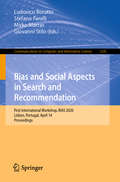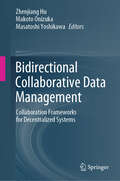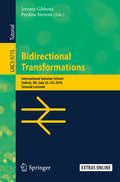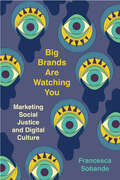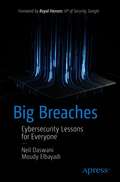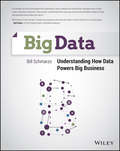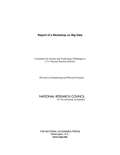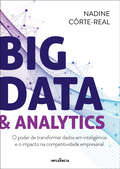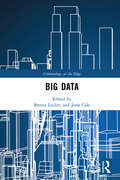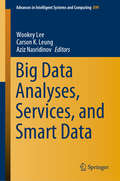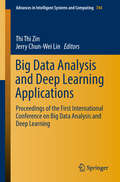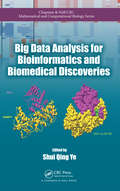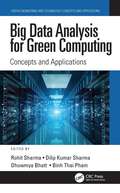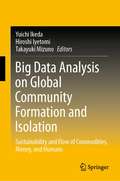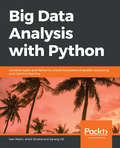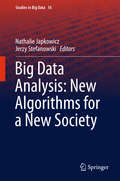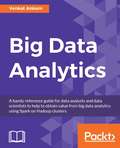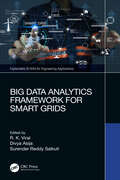- Table View
- List View
Bezonomics: How Amazon Is Changing Our Lives and What the World's Best Companies Are Learning from It
by Brian DumaineAn in-depth, revelatory, and unbiased look at Amazon&’s world-dominating business model, the current competitors either imitating or trying to outfox Amazon, and the ways Bezonomics is shaping the life of every American consumer—from an award-winning Fortune magazine writer.Like Henry Ford, Sam Walton, or Steve Jobs in the early years of Ford, Walmart, and Apple, Jeff Bezos is the business story of the decade. Bezos, the richest man on the planet, has built one of the most efficient wealth-creation machines in history with 2% of US household income being spent on nearly 500 million products shipped from warehouses in seventeen countries. Amazon&’s business model has not only turned the retail industry and cloud computing inside out, but now its tentacles are squeezing media and advertising, and disrupting the state of technology, the economy, job creation, and society at large. Amazon&’s impact is so pervasive that business leaders in nearly every sector around the world need to understand how this force of nature operates. Based on unprecedented behind-the-scenes reporting from 150 sources inside and outside of Amazon, Bezonomics unveils the underlying principles Jeff Bezos uses to achieve his dominance—customer obsession, extreme innovation, and long-term management, all supported by artificial intelligence—and shows how these are being borrowed and replicated by companies across the United States, in China, and elsewhere. Brian Dumaine shares tips for Amazon-proofing your business. Most important, Bezonomics answers the fundamental question: How are Amazon and its imitators affecting the way we live, and what can we learn from them? A goldmine for some, and a threat for others, &“Bezonomics&” has become a life-shaping force both now and in the future that every American must know more about.
Bezugssysteme (Grundlagen der Physikalischen und Mathematischen Geodäsie)
by Karl Heinz IlkDieses Lehrbuch aus der Reihe „Grundlagen der Physikalischen und Mathematischen Geodäsie“ zeigt, warum Bezugssysteme und Bezugsrahmen in der Erdmessung eine fundamentale Rolle spielen. Der Autor erläutert den Newtonschen Raum-Zeit-Begriff und gibt eine Einführung in das Einsteinsche Raum-Zeit-Konzept. Wichtige Beziehungen für die Translation der Erde im Sonnensystem werden präsentiert, und es wird ausführlich die Mechanik der Rotation der Erde im Falle drehmomentfreier Bewegungen sowie unter dem Einfluss eines luni-solaren Drehmomentes behandelt. Neben diesen grundlegenden Aspekten werden die Begriffe Ekliptik- und Äquatorsystem als raumfeste Bezugssysteme eingeführt und die Transformationen zwischen den verschiedenen Bezugssystemen bzw. zwischen den verschiedenen Bezugsrahmen behandelt. Eine Zusammenstellung verschiedener Zeitsysteme rundet das Werk ab.
Bias and Social Aspects in Search and Recommendation: First International Workshop, BIAS 2020, Lisbon, Portugal, April 14, Proceedings (Communications in Computer and Information Science #1245)
by Ludovico Boratto Stefano Faralli Mirko Marras Giovanni StiloThis book constitutes refereed proceedings of the First International Workshop on Algorithmic Bias in Search and Recommendation, BIAS 2020, held in April, 2020. Due to the COVID-19 pandemic BIAS 2020 was held virtually. The 10 full papers and 7 short papers were carefully reviewed and seleced from 44 submissions. The papers cover topics that go from search and recommendation in online dating, education, and social media, over the impact ofgender bias in word embeddings, to tools that allow to explore bias and fairnesson the Web.
Bible Adventures (Boss Fight Books)
by Gabe DurhamIn the beginning, a small unlicensed game development company was hit with divine inspiration: They could make a lot of money (and escape the wrath of Nintendo) by creating games for Christians. With the release of the 1990 NES platformer Bible Adventures, the developers saw what they had made, and it was good. Or, at least, good enough. Based on extensive research and original interviews with Wisdom Tree staff, Gabe Durham's book investigates the rise and fall of the little company that almost could, the tension between faith and commerce in the Christian retail industry, culture's retro/ironic obsession with bad games, and the simple recipe for transforming a regular game into a Christian game: throw a Bible in it and pray nobody notices.
Bidirectional Collaborative Data Management: Collaboration Frameworks for Decentralized Systems
by Zhenjiang Hu Masatoshi Yoshikawa Makoto OnizukaThis book summarizes the results of solving the two issues from a 5-year national project in Japan, called Bidirectional Information Systems for Collaborative, Updatable, Interoperable, and Trusted Sharing (BISCUITS) since 2017, with researchers from the National Institute of Informatics, Osaka University, Kyoto University, Nanzan University, Hosei University, Tohoku University, and University of Tokyo. It provides a big picture of the research results, insights, and the new perspectives achieved during the project, paving the way for future further investigation. Along with the continuous evolution of data management systems for the new market requirements, we are moving from centralized systems, which had often led to vast and monolithic databases, toward decentralized systems, where data are maintained in different sites with autonomous storage and computation capabilities. A common practice is the collaboration or acquisition of companies: there is a large demand for different systems to be connected to provide valuable services to users, yet each company has its own goal and often builds its own applications and database systems independently without federating with others. As a result, we need to construct a decentralized system by integrating the independently built databases through schema matching, data transformation, and update propagation from one database to another. There are two fundamental issues with such decentralized systems, local privacy and global consistency. By local privacy, the owner of the data stored on a site may wish to control and share data by deciding what information should be exposed and how its information should be used and updated by other systems. By global consistency, the systems may wish to have a globally consistent view of all data, integrate data from different sites, perform analysis through queries, and update the integrated data.
Bidirectional Comparison of Nominal Sets: Asymmetry of Proximity (Studies in Computational Intelligence #1140)
by Maciej Krawczak Grażyna SzkatułaThe authors propose a novel measure of proximity between two sets of nominal elements. This measure describes the changes in the first set after adding the second set or changes in the second set after adding the first set.It is crucial to note that this measure is not symmetric, it means that the perturbation of the first set on the second set can be different than the perturbation of the opposition direction. The introduced set impact measure allows for the direct treatment of objects described by nominal-valued attributes. The ordinary sets, multisets, fuzzy sets, and the intuitionistic fuzzy sets are considered. The book is intended for data science professionals, philosophers as well as cognitive psychologists, who struggle with practical problems in which asymmetry of proximity of objects cannot be neglected. The use of the proposed measures of perturbation between compared objects can be very important in data mining or in exploration of Internetresources.
Bidirectional Transformations: International Summer School, Oxford, Uk, July 25-29, 2016, Tutorial Lectures (Lecture Notes in Computer Science #9715)
by Perdita Stevens Jeremy GibbonsBidirectional transformations (BX) are means of maintaining consistency between multiple information sources: when one source is edited, the others may need updating to restore consistency. BX have applications in databases, user interface design, model-driven development, and many other domains. This volume represents the lecture notes from the Summer School on Bidirectional Transformations, held in Oxford, UK, in July 2016. The school was one of the final activities on the project "A Theory of Least Change for Bidirectional Transformations", running at the University of Oxford and the University of Edinburgh from 2013 to 2017 and funded by the UK Engineering and Physical Sciences Research Council. The five chapters included in this volume are a record of most of the material presented at the summer school. After a comprehensive introduction to bidirectional transformations, they deal with triple graph grammars, modular edit lenses, putback-based bidirectional programming, and engineering of bidirectional transformations.
Big Blues: The Unmaking of IBM
by Paul CarrollA look at what brought IBM Corporation to its knees by Wall Street reporter Paul Carroll. The author attributes the company's downfall to a combination of corporate hubris and an inability to understand the changes occurring in the computer market.
Big Book of Apple Hacks: Tips & Tools for unlocking the power of your Apple devices (Hacks)
by Chris Seibold<p>Bigger in size, longer in length, and broader in scope, the new <em>Big Book of Apple Hacks</em> offers a grab bag of tips, tricks and hacks to get the most out of Mac OS X Leopard, as well as the new line of iPods, iPhone, and Apple TV. Perfect for Mac fans and power users who really want to take control of these systems.</p>
Big Brands Are Watching You: Marketing Social Justice and Digital Culture
by Francesca SobandeHow is morality understood in the marketplace? Why do brands speak out about certain issues of injustice and not others? And what is influencer culture’s role in social and political activism? Big Brands Are Watching You investigates corporate culture, from the branding of companies and nations to television portrayals of big business and the workplace. Francesca Sobande analyzes media, interviews, survey responses, and ephemera from the history of advertising as well as exhibitions in London, brand stores in Amsterdam, a music festival in Las Vegas, and archives in Washington, DC, to illuminate the world of branding.
Big Breaches: Cybersecurity Lessons for Everyone
by Neil Daswani Moudy ElbayadiThe cybersecurity industry has seen an investment of over $45 billion in the past 15 years. Hundreds of thousands of jobs in the field remain unfilled amid breach after breach, and the problem has come to a head. It is time for everyone—not just techies—to become informed and empowered on the subject of cybersecurity.In engaging and exciting fashion, Big Breaches covers some of the largest security breaches and the technical topics behind them such as phishing, malware, third-party compromise, software vulnerabilities, unencrypted data, and more. Cybersecurity affects daily life for all of us, and the area has never been more accessible than with this book.You will obtain a confident grasp on industry insider knowledge such as effective prevention and detection countermeasures, the meta-level causes of breaches, the seven crucial habits for optimal security in your organization, and much more. These valuable lessons are applied to real-world cases, helping you deduce just how high-profile mega-breaches at Target, JPMorgan Chase, Equifax, Marriott, and more were able to occur.Whether you are seeking to implement a stronger foundation of cybersecurity within your organization or you are an individual who wants to learn the basics, Big Breaches ensures that everybody comes away with essential knowledge to move forward successfully. Arm yourself with this book’s expert insights and be prepared for the future of cybersecurity. Who This Book Is For Those interested in understanding what cybersecurity is all about, the failures have taken place in the field to date, and how they could have been avoided. For existing leadership and management in enterprises and government organizations, existing professionals in the field, and for those who are considering entering the field, this book covers everything from how to create a culture of security to the technologies and processes you can employ to achieve security based on lessons that can be learned from past breaches.
Big Crisis Data
by Carlos CastilloSocial media is an invaluable source of time-critical information during a crisis. However, emergency response and humanitarian relief organizations that would like to use this information struggle with an avalanche of social media messages that exceeds human capacity to process. Emergency managers, decision makers, and affected communities can make sense of social media through a combination of machine computation and human compassion - expressed by thousands of digital volunteers who publish, process, and summarize potentially life-saving information. This book brings together computational methods from many disciplines: natural language processing, semantic technologies, data mining, machine learning, network analysis, human-computer interaction, and information visualization, focusing on methods that are commonly used for processing social media messages under time-critical constraints, and offering more than 500 references to in-depth information.
Big Data
by Bill SchmarzoLeverage big data to add value to your businessSocial media analytics, web-tracking, and other technologies help companies acquire and handle massive amounts of data to better understand their customers, products, competition, and markets. Armed with the insights from big data, companies can improve customer experience and products, add value, and increase return on investment. The tricky part for busy IT professionals and executives is how to get this done, and that's where this practical book comes in. Big Data: Understanding How Data Powers Big Business is a complete how-to guide to leveraging big data to drive business value.Full of practical techniques, real-world examples, and hands-on exercises, this book explores the technologies involved, as well as how to find areas of the organization that can take full advantage of big data.Shows how to decompose current business strategies in order to link big data initiatives to the organization's value creation processesExplores different value creation processes and modelsExplains issues surrounding operationalizing big data, including organizational structures, education challenges, and new big data-related rolesProvides methodology worksheets and exercises so readers can apply techniquesIncludes real-world examples from a variety of organizations leveraging big dataBig Data: Understanding How Data Powers Big Business is written by one of Big Data's preeminent experts, William Schmarzo. Don't miss his invaluable insights and advice.
Big Data
by National Research Council Division on Engineering and Physical Sciences Committee for Science and Technology Challenges to U.S. National Security InterestsIn 2012, the Defense Intelligence Agency (DIA) approached the National Research Council's TIGER standing committee and asked it to develop a list of workshop topics to explore the impact of emerging science and technology. From the list of topics given to DIA, three were chosen to be developed by the Committee for Science and Technology Challenges to U.S. National Security Interests. The first in a series of three workshops was held on April 23-24, 2012. This report summarizes that first workshop which explored the phenomenon known as big data. The objective for the first workshop is given in the statement of task, which explains that that workshop will review emerging capabilities in large computational data to include speed, data fusion, use, and commodification of data used in decision making. The workshop will also review the subsequent increase in vulnerabilities over the capabilities gained and the significance to national security. The committee devised an agenda that helped the committee, sponsors, and workshop attendees probe issues of national security related to so-called big data, as well as gain understanding of potential related vulnerabilities. The workshop was used to gather data that is described in this report, which presents views expressed by individual workshop participants. Big Data: A Workshop Report is the first in a series of three workshops, held in early 2012 to further the ongoing engagement among the National Research Council's (NRC's) Technology Insight-Gauge, Evaluate, and Review (TIGER) Standing Committee, the scientific and technical intelligence (S&TI) community, and the consumers of S&TI products.
Big Data & Analytics: O poder de transformar dados em inteligência artificial e o impacto na competitividade empresarial
by Nadine Côrte-RealTRANSFORME DADOS EM DECISÕES INTELIGENTES E POTENCIE A CRIAÇÃO DE VANTAGENS COMPETITIVAS. Os dados são considerados o novo petróleo do século XXI e o verdadeiro ativo escondido nas empresas. Nunca se produziram, trocaram e partilharam tantos dados ao atual ritmo exponencial e alucinante. A este fenómeno chamamos big data. O aparecimento do big data e da Internet of Things veio desafiar a forma como guardamos, processamos, gerimos e analisamos esses mesmos dados, revolucionando a vida e o comportamento tanto da sociedade como das empresas. Nunca foi tão difícil selecionar informação fidedigna, pois são tantas as fontes de informação como de desinformação. Nesta era digital, saber olhar para a informação certa no momento certo é crucial na tomada de decisão. Por isso, ser data-driven, deixar os dados falarem por si só e tomar decisões com base em smart data, é uma transformação profunda que, certamente, mudará o rumo dos negócios das empresas.Neste guia prático, Nadine Côrte-Real, especialista em Gestão de Informação, concentra num só livro um conjunto de boas práticas e recomendações em várias vertentes da gestão de informação: governação, big data analytics e inteligência artificial responsável. Através deste livro conseguirá obter conhecimento estratégico para: - Gerir e governar informacao de forma eficiente para o negocio, promovendo oportunidades de monetizacao dos dados e criando vantagens competitivas, seja qual for a indústria, a dimensão e contexto tecnológico da empresa; - Potenciar a aceleração digital do negócio e criar um ecossistema de inovação e transformação digital alinhado com os objetivos estratégicos da empresa; - Assegurar a adoção de ferramentas de governação, big data analytics e inteligência artificial para criar valor de negócio sustentável e continuo; #- Promover o desenvolvimento de uma organização data-driven com foco na inteligência da informação e conhecimento do negócio.
Big Data (Criminology at the Edge)
by Benoit Leclerc Jesse CaleThe internet has launched the world into an era into which enormous amounts of data are generated every day through technologies with both positive and negative consequences. This often refers to big data . This book explores big data in organisations operating in the criminology and criminal justice fields. Big data entails a major disruption in the ways we think about and do things, which certainly applies to most organisations including those operating in the criminology and criminal justice fields. Big data is currently disrupting processes in most organisations – how different organisations collaborate with one another, how organisations develop products or services, how organisations can identify, recruit, and evaluate talent, how organisations can make better decisions based on empirical evidence rather than intuition, and how organisations can quickly implement any transformation plan, to name a few. All these processes are important to tap into, but two underlying processes are critical to establish a foundation that will permit organisations to flourish and thrive in the era of big data – creating a culture more receptive to big data and implementing a systematic data analytics-driven process within the organisation. Written in a clear and direct style, this book will appeal to students and scholars in criminology, criminal justice, sociology, and cultural studies but also to government agencies, corporate and non-corporate organisations, or virtually any other institution impacted by big data.
Big Data Analyses, Services, and Smart Data (Advances in Intelligent Systems and Computing #899)
by Wookey Lee Carson K. Leung Aziz NasridinovThis book covers topics like big data analyses, services, and smart data. It contains (i) invited papers, (ii) selected papers from the Sixth International Conference on Big Data Applications and Services (BigDAS 2018), as well as (iii) extended papers from the Sixth IEEE International Conference on Big Data and Smart Computing (IEEE BigComp 2019). The aim of BigDAS is to present innovative results, encourage academic and industrial interaction, and promote collaborative research in the field of big data worldwide. BigDAS 2018 was held in Zhengzhou, China, on August 19–22, 2018, and organized by the Korea Big Data Service Society and TusStar. The goal of IEEE BigComp, initiated by Korean Institute of Information Scientists and Engineers (KIISE), is to provide an international forum for exchanging ideas and information on current studies, challenges, research results, system developments, and practical experiences in the emerging fields of big data and smart computing. IEEE BigComp 2019 was held in Kyoto, Japan, on February 27–March 02, 2019, and co-sponsored by IEEE and KIISE.
Big Data Analysis and Deep Learning Applications: Proceedings of the First International Conference on Big Data Analysis and Deep Learning (Advances in Intelligent Systems and Computing #744)
by Jerry Chun-Wei Lin Thi Thi ZinThis book presents a compilation of selected papers from the first International Conference on Big Data Analysis and Deep Learning Applications (ICBDL 2018), and focuses on novel techniques in the fields of big data analysis, machine learning, system monitoring, image processing, conventional neural networks, communication, industrial information, and their applications. Readers will find insights to help them realize more efficient algorithms and systems used in real-life applications and contexts, making the book an essential reference guide for academic researchers, professionals, software engineers in the industry, and regulators of aviation authorities.
Big Data Analysis for Bioinformatics and Biomedical Discoveries (Chapman & Hall/CRC Computational Biology Series)
by Shui Qing YeDemystifies Biomedical and Biological Big Data AnalysesBig Data Analysis for Bioinformatics and Biomedical Discoveries provides a practical guide to the nuts and bolts of Big Data, enabling you to quickly and effectively harness the power of Big Data to make groundbreaking biological discoveries, carry out translational medical research, and implem
Big Data Analysis for Green Computing: Concepts and Applications (Green Engineering and Technology)
by Rohit SharmaThis book focuses on big data in business intelligence, data management, machine learning, cloud computing, and smart cities. It also provides an interdisciplinary platform to present and discuss recent innovations, trends, and concerns in the fields of big data and analytics. Big Data Analysis for Green Computing: Concepts and Applications presents the latest technologies and covers the major challenges, issues, and advances of big data and data analytics in green computing. It explores basic as well as high-level concepts. It also includes the use of machine learning using big data and discusses advanced system implementation for smart cities. The book is intended for business and management educators, management researchers, doctoral scholars, university professors, policymakers, and higher academic research organizations.
Big Data Analysis on Global Community Formation and Isolation: Sustainability and Flow of Commodities, Money, and Humans
by Yuichi Ikeda Hiroshi Iyetomi Takayuki MizunoIn this book, the authors analyze big data on global interdependence caused by the flows of commodities, money, and people, using a network science approach to obtain differing views of globalization and to clarify the facts on isolation of communities. Globalization reduces international economic inequality, i.e., it allows emerging countries to catch up while it increases relative poverty in some advanced countries. How should this trade-off between international and domestic inequalities be resolved? At the same time, the reduction of biocultural diversity caused by globalization needs to be avoided. What kind of change is required in local communities to conserve biocultural diversity? On the issue of commodity flow, research results of the supply-chain network, isolation in industry, and resource flows and stocks are presented in this book. For monetary flow, ownership networks, value-added networks, and profit shifting were studied; and regarding the flow of people, linkage of ethnic groups, immigrant assimilation, and refugees were examined. Based on the resulting view of globalization and isolation, the development of the isolation index using machine learning is discussed. Finally, recommendations for evidence-based policymaking in the United Nations are considered.
Big Data Analysis with Python: Combine Spark and Python to unlock the powers of parallel computing and machine learning
by Ivan MarinThe audience is expected to know basic statistical measurements (mean, median, standard deviation, and so on), some kinds of graphs (line graph, scatter plot, and so on) and have working knowledge of relational databases. Python programming or other programming language experience is required. Having knowledge about distributed systems and/or Hadoop is useful.
Big Data Analysis: New Algorithms for a New Society (Studies in Big Data #16)
by Nathalie Japkowicz Jerzy StefanowskiThis edited volume is devotedto Big Data Analysis from a Machine Learning standpoint as presented by some ofthe most eminent researchers in this area. It demonstrates that Big Data Analysis opens up new researchproblems which were either never considered before, or were only consideredwithin a limited range. In addition to providing methodological discussions onthe principles of mining Big Data and the difference between traditionalstatistical data analysis and newer computing frameworks, this book presentsrecently developed algorithms affecting such areas as business, financialforecasting, human mobility, the Internet of Things, information networks,bioinformatics, medical systems and life science. It explores, through a numberof specific examples, how the study of Big Data Analysis has evolved and how ithas started and will most likely continue to affect society. While the benefitsbrought upon by Big Data Analysis are underlined, the book also discusses someof the warnings that have been issued concerning the potential dangers of BigData Analysis along with its pitfalls and challenges.
Big Data Analytics
by Venkat AnkamA handy reference guide for data analysts and data scientists to help to obtain value from big data analytics using Spark on Hadoop clusters About This Book * This book is based on the latest 2.0 version of Apache Spark and 2.7 version of Hadoop integrated with most commonly used tools. * Learn all Spark stack components including latest topics such as DataFrames, DataSets, GraphFrames, Structured Streaming, DataFrame based ML Pipelines and SparkR. * Integrations with frameworks such as HDFS, YARN and tools such as Jupyter, Zeppelin, NiFi, Mahout, HBase Spark Connector, GraphFrames, H2O and Hivemall. Who This Book Is For Though this book is primarily aimed at data analysts and data scientists, it will also help architects, programmers, and practitioners. Knowledge of either Spark or Hadoop would be beneficial. It is assumed that you have basic programming background in Scala, Python, SQL, or R programming with basic Linux experience. Working experience within big data environments is not mandatory. What You Will Learn * Find out and implement the tools and techniques of big data analytics using Spark on Hadoop clusters with wide variety of tools used with Spark and Hadoop * Understand all the Hadoop and Spark ecosystem components * Get to know all the Spark components: Spark Core, Spark SQL, DataFrames, DataSets, Conventional and Structured Streaming, MLLib, ML Pipelines and Graphx * See batch and real-time data analytics using Spark Core, Spark SQL, and Conventional and Structured Streaming * Get to grips with data science and machine learning using MLLib, ML Pipelines, H2O, Hivemall, Graphx, SparkR and Hivemall. In Detail Big Data Analytics book aims at providing the fundamentals of Apache Spark and Hadoop. All Spark components - Spark Core, Spark SQL, DataFrames, Data sets, Conventional Streaming, Structured Streaming, MLlib, Graphx and Hadoop core components - HDFS, MapReduce and Yarn are explored in greater depth with implementation examples on Spark + Hadoop clusters. It is moving away from MapReduce to Spark. So, advantages of Spark over MapReduce are explained at great depth to reap benefits of in-memory speeds. DataFrames API, Data Sources API and new Data set API are explained for building Big Data analytical applications. Real-time data analytics using Spark Streaming with Apache Kafka and HBase is covered to help building streaming applications. New Structured streaming concept is explained with an IOT (Internet of Things) use case. Machine learning techniques are covered using MLLib, ML Pipelines and SparkR and Graph Analytics are covered with GraphX and GraphFrames components of Spark. Readers will also get an opportunity to get started with web based notebooks such as Jupyter, Apache Zeppelin and data flow tool Apache NiFi to analyze and visualize data. Style and approach This step-by-step pragmatic guide will make life easy no matter what your level of experience. You will deep dive into Apache Spark on Hadoop clusters through ample exciting real-life examples. Practical tutorial explains data science in simple terms to help programmers and data analysts get started with Data Science
Big Data Analytics Framework for Smart Grids (Explainable AI (XAI) for Engineering Applications)
by Surender Reddy Salkuti Divya Asija R. K. ViralThe text comprehensively discusses smart grid operations and the use of big data analytics in overcoming the existing challenges. It covers smart power generation, transmission, and distribution, explains energy management systems, artificial intelligence, and machine learning–based computing. •Presents a detailed state-of-the-art analysis of big data analytics and its uses in power grids. • Describes how the big data analytics framework has been used to display energy in two scenarios including a single house and a smart grid with thousands of smart meters. •Explores the role of the internet of things, artificial intelligence, and machine learning in smart grids. • Discusses edge analytics for integration of generation technologies, and decision-making approaches in detail. • Examines research limitations and presents recommendations for further research to incorporate big data analytics into power system design and operational frameworks. &nb
